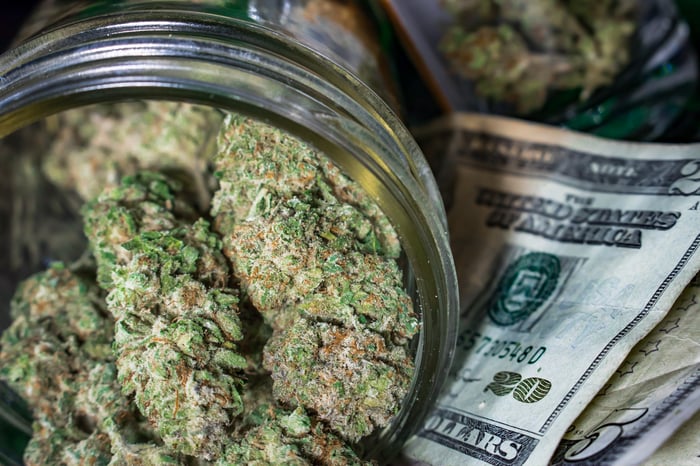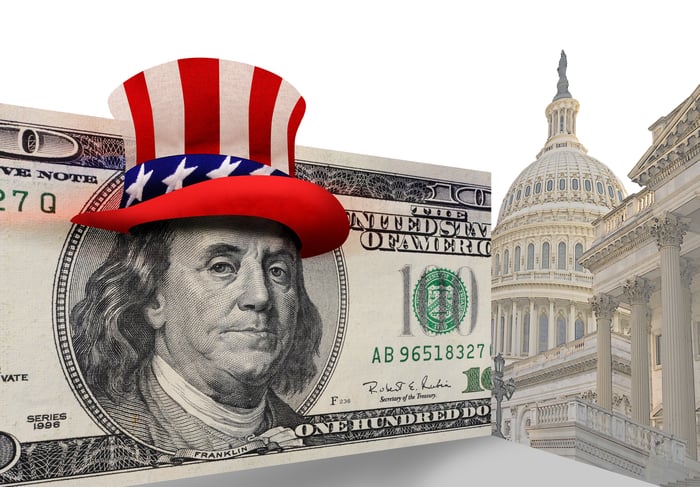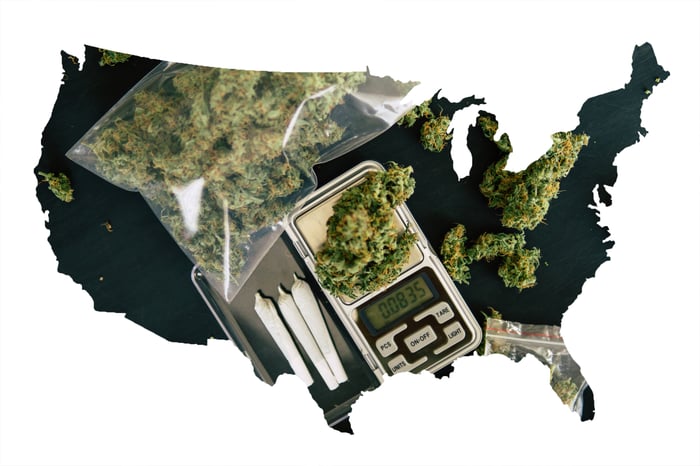This was a week that pro-cannabis enthusiasts had long hoped for. On Tuesday, Jan. 5, Georgia residents went to the polls, once again, to decide which two candidates should represent their state in the U.S. Senate. With Republicans holding 50 seats and Democrats (including Independents in this total) having won 48 seats, it would have required only one GOP victory among these two elections to secure a majority in the Senate through early 2023. But that wasn't the outcome.
When the dust cleared, both Democratic Party candidates won, putting the upper house of Congress at a 50-50 tie. In the Senate, ties are broken by the Vice President, which in less than two weeks will be Democrat Kamala Harris. This win effectively gives Democrats control of the House, Senate, and White House, albeit by the slimmest of margins, assuming lawmakers vote according to party line.

Image source: Getty Images.
Few, if any, industries benefited more directly from this vote than marijuana. The presumption is that control of the legislative branch of government could allow for the passage of cannabis banking reform and/or cannabis legalization measures. Without Mitch McConnell (R-Ky.) blocking cannabis legislation as Senate Majority Leader, bills focused on pot could at least make their way to the Senate floor for a vote. Remember, an all-time record 68% of adults surveyed by Gallup in the fall of 2020 favored a nationwide legalization of marijuana.
For what it's worth, President-elect Joe Biden has not suggested that he favors legalizing weed nationwide. His campaign pledge involves decriminalizing and rescheduling marijuana at the federal level, which is a modest step forward, but nothing more.
The long-running assumption has always been that legalization would be an overwhelming positive for the industry. Pot stocks would finally have consistent access to capital, and marijuana companies wouldn't be required to open redundant operations in legalized states (e.g., cultivation farms and processing sites). Since interstate transport isn't currently allowed, marijuana stocks usually need to open cultivation and/or processing facilities in the states in which they have operating dispensaries.
But what you might not realize is that legalizing marijuana comes with a trio of hidden issues.

Image source: Getty Images.
1. Giving pot the green light probably makes legal weed less price-competitive
Should the federal government agree to give adult-use cannabis the green light, you can pretty much be assured there'll be an excise tax attached to each sale. The U.S. pot market could reach an estimated $75 billion in annual sales by 2030, and the revenue generated from these sales could partially help offset what have been monstrous annual federal budget deficits.
The concern is that cannabis is already facing taxation in legalized states. If the federal government chooses to tack on, say, a 5% excise tax to each sale, that'll be another 5% increase in the final cost of legal weed. Retailers in legalized states are already having to compete against lower-cost black market marijuana, and they're not always coming out ahead. An additional tax would only widen the gap between legal and illicit channels, making it that much harder for licensed producers to succeed.

Image source: Getty Images.
2. The federal government could actually lose revenue-generating capacity
Here's a real head-scratcher: Even with an excise tax on legal pot sales, it's actually possible that tax revenue generated by the federal government could decline with legalization over the current setup.
Cannabis companies in the U.S. are currently subject to Section 280E of the U.S. tax code. Implemented in the early 1980s to stop illicit drug dealers from taking tax write-offs associated with their underground business, 280E disallows pot companies from taking normal corporate income tax deductions, save for cost of goods sold. Typically, cost of goods sold accounts for a small percentage of total sales. The end result is a disproportionately high (albeit perfectly legal) effective tax rate on profitable marijuana companies.
If cannabis were to be legalized, pot companies would no longer be subject to Section 280E. Even with higher aggregate cannabis sales across the country, a considerably lower effective tax rate could lead to the federal government collecting billions less in revenue over the next decade.

Image source: Getty Images.
3. Competition would pick up in a big way
Finally, investors might be overlooking just how crowded the U.S. market could become if cannabis were legalized at the federal level.
It's not just small-time U.S. operators that would suddenly have a broader reach. Federal legalization in the U.S. would allow Canadian-licensed producers that've struggled mightily in their home market to descend on the much more lucrative U.S. market.
For those who might not remember, Canopy Growth (CGC -10.51%), the largest and most cash-rich pot stock in the world, agreed to acquire Acreage Holdings in April 2019 on a contingency basis via a cash-and-stock deal. The contingency was that the U.S. federal government would have to legalize marijuana prior to the deal coming to fruition. As of the third quarter of 2020, Acreage held 71 dispensary licenses in 15 states, and 28 stores were operational. Canopy's deep-pocketed balance sheet could supply capital to hasten the rollout of retail stores in legalized states.
And it's not just Canopy Growth and Acreage. Tilray (TLRY) and Aphria (APHA) recently announced their intent to merge. As a larger company, Tilray and Aphria are expected to save on cost synergies, reduce their combined growing costs, and more easily reach new markets. This is especially true with Tilray's Manitoba Harvest acquisition, which gives the company access to more than 16,000 retail doors throughout North America.
The point is, U.S. multistate operators are actually in a more advantageous position if marijuana remains illegal at the federal level. As long as cannabis is illicit, well-funded and/or brand-name marijuana stocks from Canada won't enter the U.S. market.
If legalization occurs in 2021, it may not be the cakewalk to profits that everyone seems to expect.





